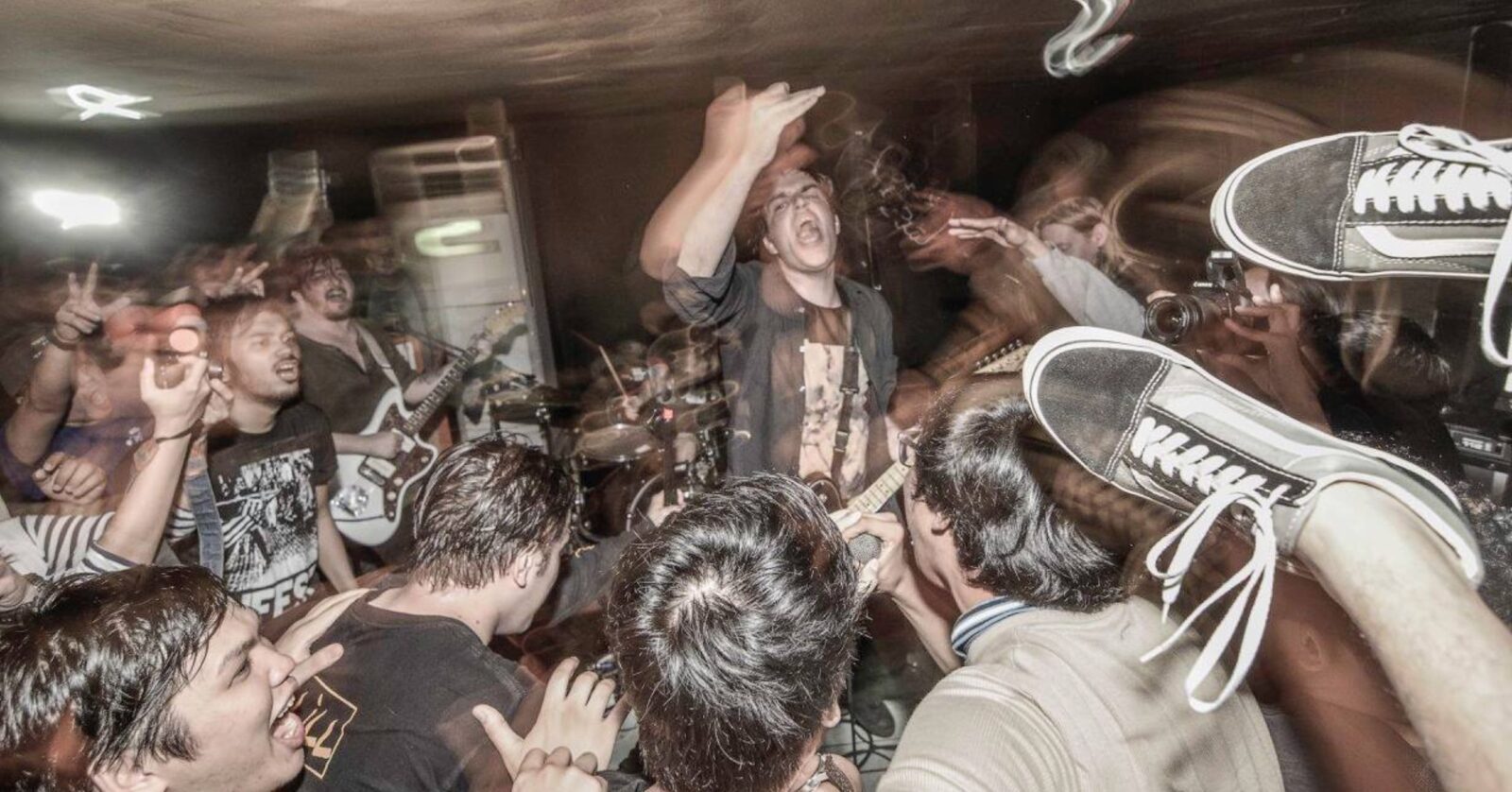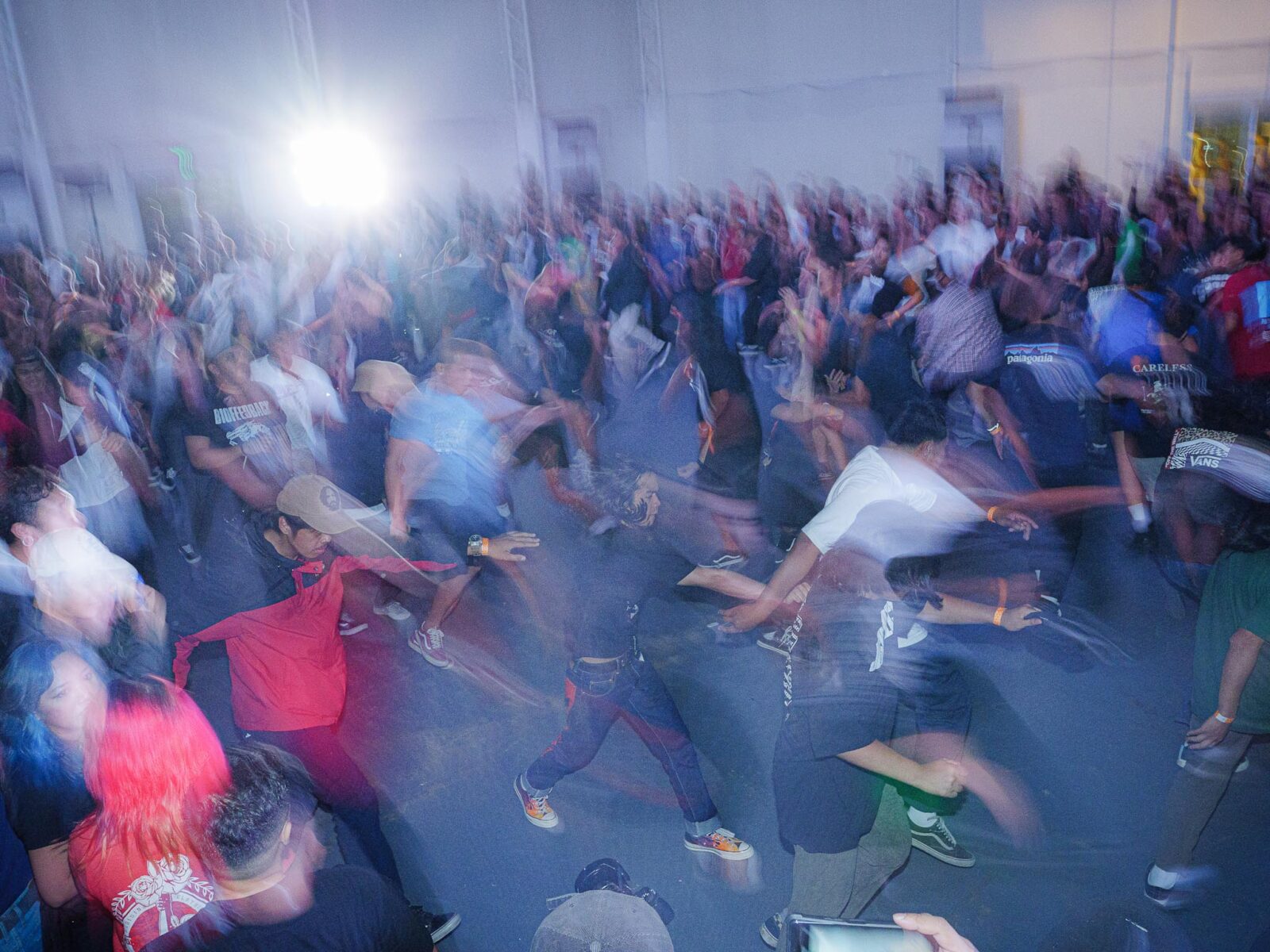DIY Or Die: How Sleeping Boy Collective Champions Underground Music In The Philippines
Driven by integrity, community, and dedication, Sleeping Boy Collective has brought some of the best international underground bands to the Philippines while uplifting homegrown talent.

The Saddest Landscape: photographed by Keith Dador, courtesy of Sleeping Boy Collective
The Saddest Landscape: photographed by Keith Dador, courtesy of Sleeping Boy Collective
We live in a time when artists and their music that have long been considered by many as niche are no longer as “underground” as some might think they are. Whether they be hardcore punk, shoegaze, dream pop, screamo, or even extreme metal, many of these acts are finding a growing following like never before, especially among the youth. Some are even penetrating the mainstream, vying for Grammys, playing festivals like Coachella and Glastonbury, or making noise on U.S. late night television.
In the Philippines, it’s undeniable that these aforementioned forms of music and artists are still somewhat underrated. However, this doesn’t mean that dedicated communities formed by and for them aren’t thriving and expanding in their own ways, especially within the underground. One such community is Sleeping Boy Collective.
What They Do
For over ten years now, Sleeping Boy Collective (SBC) have brought over many beloved acts in alternative and underground music, such as Counterparts, Deafheaven, Softcult, METZ, No Pressure, Citizen, Regulate, Power Trip, and more.
“We just wanted to put up shows for the bands we wanted to see, whether foreign or local, and build a safe, inclusive, community behind it to keep it thriving long after SBC is gone,” shares the group to Billboard Philippines.
For the team, it all starts with taking the right initiatives to make it all possible. “When we see an artist we like has booked a tour in Asia or Australia, we’ll reach out to agents, fellow promoters, or to the artists themselves to find out if they’re interested in performing in Manila,” they say. “Everything is basically done via emails or DMs.”
Once they establish a conversation with these acts, it becomes “a matter of negotiating a deal that works for both parties.” This can sometimes be “as straightforward as meeting artist fees and other requirements,” while other cases include “closing a deal” that involves working with “promoters from other countries to put together a whole tour within the region to make it worthwhile for the bands.”
“There’s really no big secret to what we do,” the team expounds. “With the right people and the right motivation, anyone can do it — it’s just a matter of how much you want it and how hard you’re willing to work to make it happen.”
Challenges
Of course, curating and producing these shows don’t come without its hurdles. One major challenge has always been ticket prices. This means “keeping ticket prices as affordable as possible in the current economy,” while maintaining their ethos of “deliberately foregoing any sort of corporate sponsorship,” even if it entails that their shows “are always at risk of losing money.”
Logistics is another matter. “There are lots of things that go into putting up and promoting shows, and keeping expenses down means doing everything ourselves, from booking venues and accommodations, taking care of artists, manning the doors, and running the merch table,” they share, noting that SBC is 100% composed of volunteers “who put in so much of their personal time and finances just to make things happen.” And ultimately, this is exactly what has helped their DIY-driven community “going for so long.”
Challenges like this have proven that experience is indeed the best teacher, and these issues have taught them to “be more resourceful and keep expenses as low as possible.” However, this doesn’t mean that they were alone throughout their journey.
“We have also been fortunate to receive amazing support from the larger DIY music community, from fellow organizers who help us out with logistics and gear,” states the team, spotlighting local hardcore label Still Ill and non-profit, fundraising punk community Counterflow, who have been their frequent collaborators. The SBC team also acknowledges venues like 123 Block and Mow’s, whose owners go “the extra mile to accommodate [their] unique needs,” as well as “the showgoers who take the time to check out and support the bands, even if they’re not familiar with them.”
“We’ve had a few last-minute show cancellations before, which is always catastrophic, but a lot of community members still show up to support the local bands and donate to help cushion the losses.” The team also notes how “incredibly lucky” they are to have a dedicated community that understands that “the whole thing would immediately fall apart if not for everyone pitching in with whatever they can.”
Turning Point
Despite these challenges, Sleeping Boy Collective continues to push forward. About three years into their journey, the team came to an inspiring realization when it produced the first-ever Manila show of dream pop favorites Turnover. Here, they saw a significant, almost unexpected audience for the American indie act, even if their genre was still considered very niche here.
“We knew [Turnover] had potential crossover appeal outside of our usual hardcore/punk circles, but we never imagined 800 people would show up,” the team shares. “That also made us realize that we can’t just do it only for ourselves — we have an implicit responsibility to connect these artists to their audience and vice versa.”
And connect them they did. After that inaugural Turnover gig, Sleeping Boy Collective eventually saw an audience of over 1,700 strong at the Manila comeback concert of American alternative rock band Movements in early 2023, among other successful shows.
Audience Matters
“In recent years, approximately half of the tours we work on started with the artists or their team approaching us to ask if we’d be interested to put up a show for them in the country,” they share. “As long as we like their music and the terms are reasonable, we try to accommodate requests as much as we can.”
The SBC team explains that an artist’s audience size in the Philippines plays “very little” into their decision of who to bring over. “The very first thing we ask ourselves is if we like their music and if their values and ethics align with ours,” they clarify. “Most of us in the team have our respective 9-to-5 jobs, and we would rather spend our precious time and energy working on music we actually care about instead of promoting artists that we don’t actually enjoy listening to, even if that artist has a massive audience in the country.”
“Audience size only comes into play when trying to gauge whether the show will likely break even, or estimate how much money we’ll probably lose,” continues the team. But if the artist is one that the team particularly likes, and can give an inspiring performance, SBC is likely to put up a show for them anyway.
On Inclusivity and Growth
With more people becoming increasingly involved with the local music scene post-pandemic, many are eager to catch the artists they discovered during the lockdown and join communities that share their love for the same kinds of music. In order for these communities to become more inclusive to newcomers, Sleeping Boy Collective believes that we have to start “with being intentional about the spaces we continue to build.”
“That means cultivating a safe, welcoming environment, whether in the way we communicate online or the way we run our shows, “ they emphasize. “It also means constantly looking out for new, exciting bands to showcase, or engaging younger, like-minded groups with similar goals and ethics to explore more opportunities to collaborate.”
Within the next five years, Sleeping Boy Collective sees the Philippine alternative music scene potentially “[breaking] out on a broader scale from the ground up” in a musical sense. On the community side of things, they look forward to witnessing “a cohesive network of inter-island/inter-city tours, both for local and international acts, to get heavily solidified,” after having seen similar groundswells in places like Tuguegarao, Baguio, Naga, Cebu, Bacolod, Cagayan De Oro, Davao, and more.

Photographed by JRex Chiu, courtesy of Sleeping Boy Collective
Moving Forward Together
Ultimately, Sleeping Boy Collective affirms that the only concrete goal they’ve always had is to simply keep doing what they do “for as long as [they] can,” and most importantly, “on [their] own terms.”
“Every now and then there are moments that remind us that we are still doing something good and worthwhile. Watching a band we’ve listened to for years finally play live in a room full of people who care just as much is a reward in itself, as well as seeing local bands get the recognition that they deserve.” concludes the team. “Connecting and sharing space with equally passionate people with similar values and interests is a beautiful thing.”